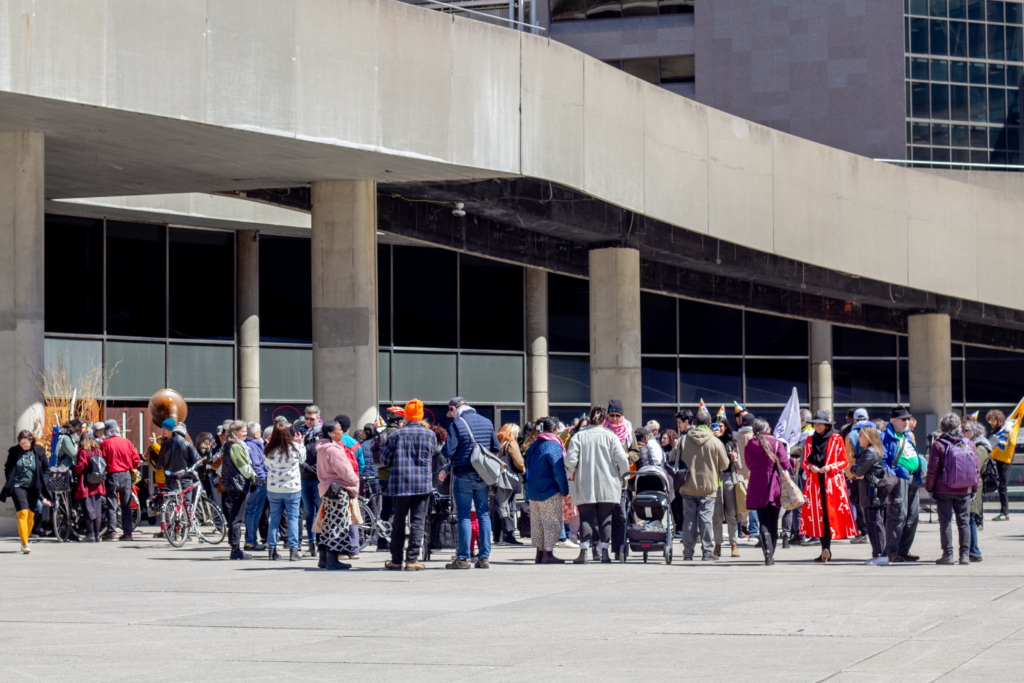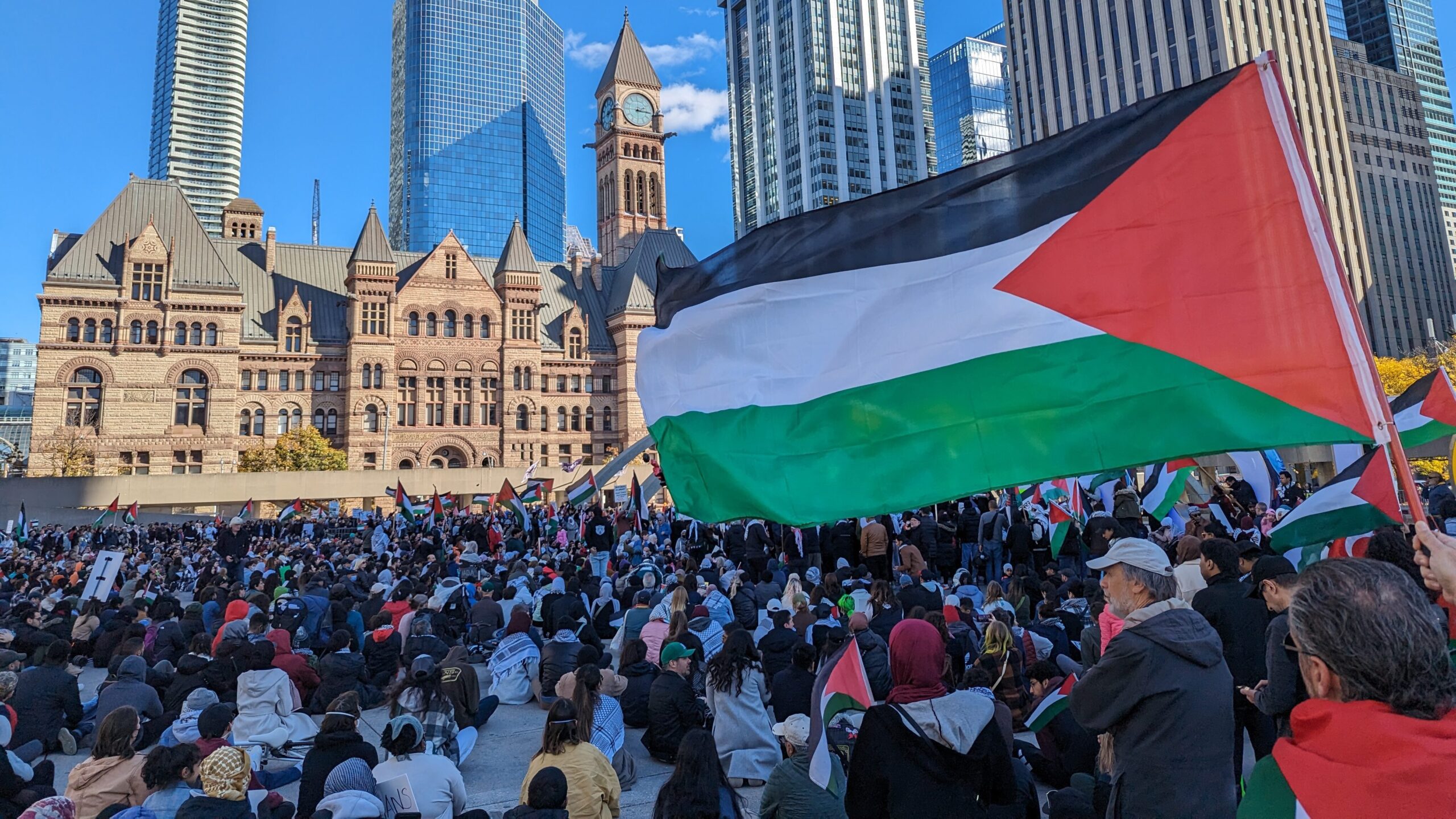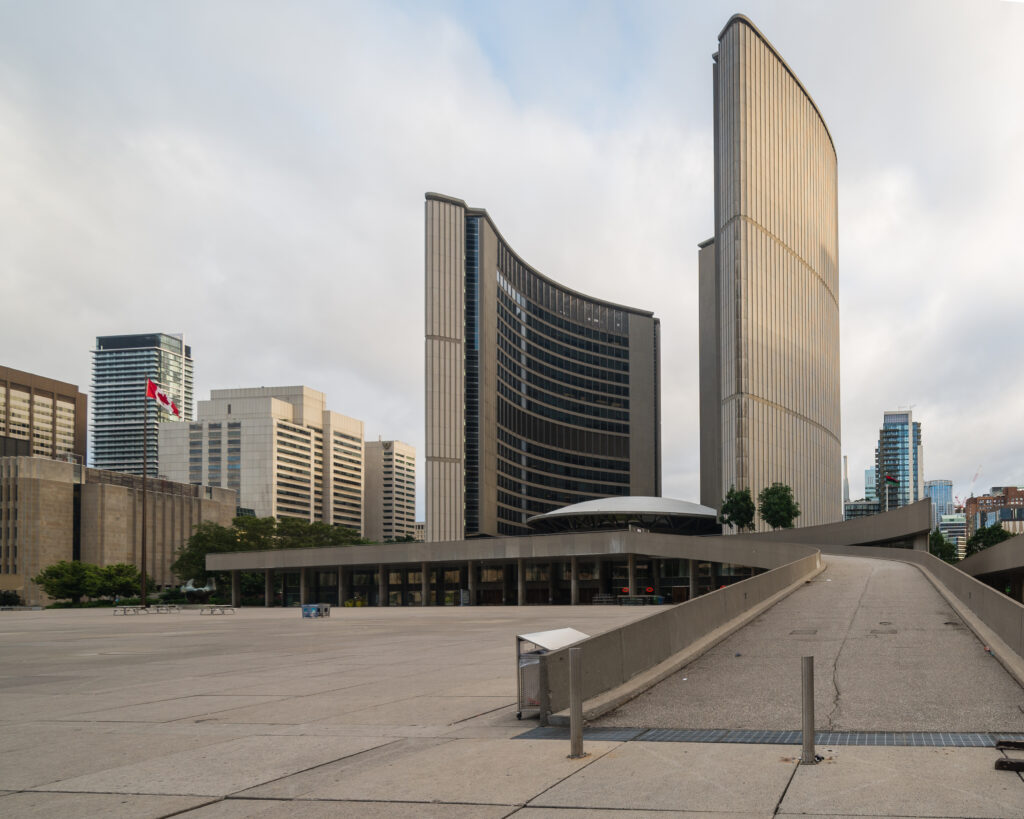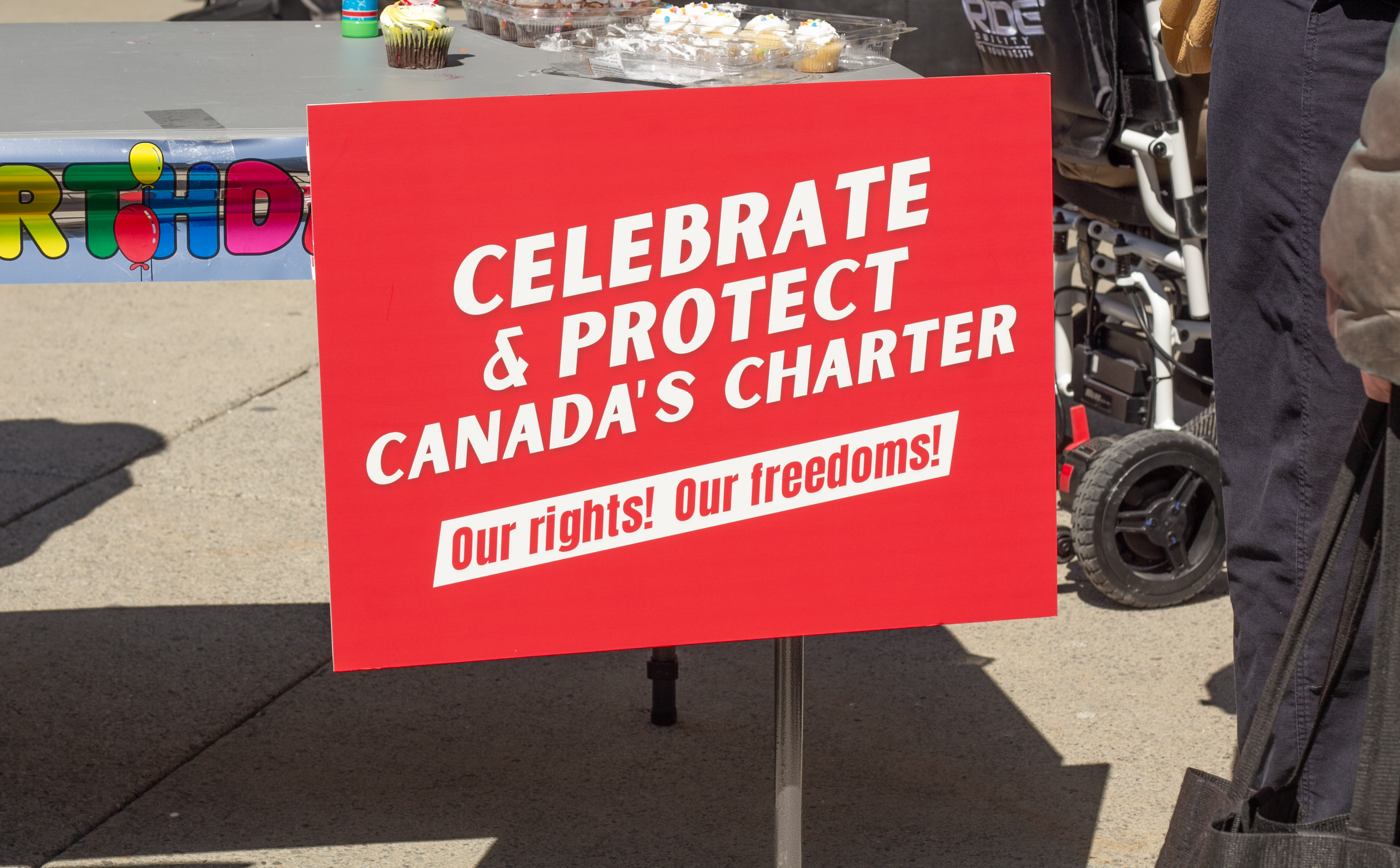Toronto City councillors are expected to release a report this month following consultations around a proposed bylaw that, if passed, would ban protests occurring close to “vulnerable” institutions including schools and religious institutions.Lawyers and human rights advocates say the bylaw targets pro-Palestine speech and demonstrations.
On Thursday, April 17, hundreds of workers and activists, including members of the Coalition for Charter Rights and Freedoms, gathered in front of City Hall to protest the proposed City of Toronto’s protest bubbles bylaw. The coalition includes members of Migrant Workers Alliance for Change, Jews Say No to Genocide, and CUPE Locals 3903 and 2484. City councillors Chris Moise, Gord Perks and Alejandra Bravo were also present at the demonstration.
The city’s bylaw is modelled on a controversial City of Vaughn bylaw passed in June 2024. That bylaw imposes a 100-metre distance between demonstrations and “vulnerable” institutions. This includes schools, faith-based institutions and cultural centres. In Vaughn, the maximum fine for violating the “Protecting Vulnerable Social Infrastructure By-law” is $100,000.
Activists, lawyers and members of unions and civil rights organizations have denounced the proposed City of Toronto bylaw for effectively banning protests anywhere in downtown Toronto. They say the bylaw would threaten fundamental freedoms upheld and protected by the Canadian Charter of Rights and Freedoms, specifically, Section 2C, which enshrines the right to peaceful assembly.

An attempt to repress Palestine solidarity
Earlier this month, Ontario’s highest court found that the province’s COVID-19 restrictions on gathering had infringed on this constitutional right. Even as the provincial government refuses to enact these “bubble” laws, the supposedly more progressive city council is going ahead with it.
“City bylaws are enforced by fines,” explains Arash Ghiassi, a criminal defence lawyer, to The North Star. “A police officer or bylaw officer could issue someone a ticket, but there’s normally no authority to arrest someone.” Still, the bylaw will likely have a “chilling effect” on protests and, according to Ghiassi, it is “obvious that it’s meant to target pro-Palestine expression.”
Rev. Dr. Paul Shepherd of the United Church of Canada spoke to The North Star at Thursday’s rally. He pointed out the same elephant in the room: “It’s really this unwritten fact that this is about stopping Palestinian protests, and I don’t know why that isn’t just being spoken about more clearly. I’ve been to these protests, and they’ve always been very peaceful.”
Canadian media and politicians from all major parties have continually invested resources in portraying those protesting Israel‘s ongoing genocide in Gaza as violent, hateful and antisemitic. The $20 million police budget increase approved by Mayor Olivia Chow in February 2024 has resulted in multiple cases of police brutality and dozens of meritless arrests intended to weaken the anti-genocide movement.
“It was really only after Palestine solidarity protests that this bylaw was proposed,” commented Louise, a Jewish activist from Independent Jewish Voices.
“Protests in synagogues have not been targeted at people worshipping. The protests have happened when there have been political events [like real estate sales of occupied land] that are held in synagogues,” she told The North Star. “Telling people that they cannot protest the Israeli state—we don’t have rules like that for other countries. Every state that makes political decisions should be criticized when those decisions are causing harm to people.”

Dubious claims of antisemitism
City councillors have focused on protests outside synagogues as examples to justify this bylaw. Louise says these incidents have been misrepresented to fit false, fear-mongering narratives and to dangerously conflate legitimate political criticisms of the state of Israel with antisemitism.
“So, real estate sales [are happening] in synagogues where land is being sold that is in internationally recognized, illegally occupied territories,” she explained. “It asks the question—is it justified to use sacred space for selling illegally occupied land?”
“The right to protest includes protests of religious institutions,” says to Mr. Ghiassi. “For example, several churches have been implicated in residential schools in Canada. It would be absurd to say that people shouldn’t have the right to protest those churches in the same way it is absurd to suggest that people shouldn’t have the right to protest the illegitimate sale of Palestinian lands at some synagogues.”
Protests near other Jewish-founded institutions in the city have been held up as justification for this bill, notably a march whose route passed by Mount Sinai Hospital. Claims of antisemitism at this emergency rally, held while Israel was intensely bombing Rafah, are unfounded. The protest was passing by the hospital on its usual route on University Avenue, not protesting outside it.
A flawed consultation process
Though the City has been engaged for the past month in consultations to gather feedback about the bylaw from community members, the process has been criticized as biased, poorly designed and deeply flawed.
The consultation’s questions are condemned by the coalition for reinforcing negative stereotypes and presupposing agreement that certain institutions are indeed vulnerable. One question, for example, asks, “How frequently have you experienced and/or felt any of the following when encountering a demonstration in Toronto?” with five out of the eight options reflecting negative sentiments such as “I have not been able to access the building I want,” or “I am scared.”
Another question asks, “If Toronto adopted a bylaw that prohibited certain activities within specific distances around vulnerable institutions, what distance do you think would be most appropriate?”
“I’m not opposed to public consultations in general, but the survey needs to be designed well,” says Mr. Ghiassi. “Here, the survey is poorly designed and is likely to obtain skewed results. You might imagine you’d get different answers if you ask someone, ‘Aren’t those protesters annoying?’ versus asking them, ‘Should we destroy the right to peaceful assembly?’”

An attack on social movements
Consultations for the bylaw concluded on May 1. The city is now set to deliver a report based on their findings. Though the city claims that the bylaw “is not intended to prohibit peaceful and lawful demonstrations,” the threat to social movements and the discriminatory silencing of the pro-Palestinian movement in particular is clear.
The right to protest and take up space in the street has driven social progress throughout history. This bylaw risks the regression of hard-won freedoms.
“I think City councillors need to be brave in this moment,” says Louise. “I know there is a lot of fear. But chipping away at our rights—it never stops with the first thing. We have to stand against it. If we let this go, there’s going to be more. So, we need to stop it right now.”


Be part of the conversation!
Only subscribers can comment. Subscribe to The North Star to join the conversation under our articles with our journalists and fellow community members. If you’re already subscribed, log in.